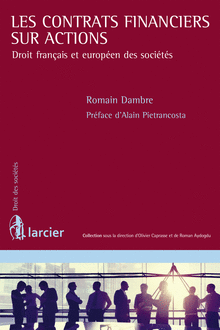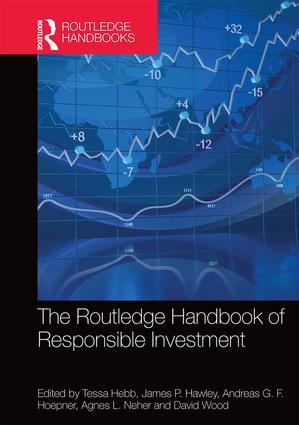autres publications engagement et activisme actionnarial Normes d'encadrement
Actions et contrats financiers : un travail prometteur
Ivan Tchotourian 27 mai 2016
M. Romain Dambre propose un bel ouvrage aux éditions Bruylant intitulé : « Les contrats financiers sur actions : Droit français et européen des sociétés ». Un beau sujet que l’auteur aborde !
Les contrats financiers permettent aux parties de façonner le monde à l’image d’un profil de risque optimal : les parties y créent les conditions d’une réalité dérivée, un monde synthétique purgé de risques indésirables. Instruments de transfert de risque, les contrats financiers portent la marque d’une forte abstraction à l’égard du bien sous-jacent. Si les parties peuvent souhaiter fixer les conditions d’un transfert différé de la propriété, elles privilégient souvent la vertu protectrice ou le potentiel spéculatif de ces instruments en considérant les attributs économiques attachés à la propriété du bien sous-jacent plutôt que sa titularité sur le plan juridique.
Se dégage alors une règle d’autonomie du contrat financier à l’égard du bien comme du contrat sous-jacents, justifiée notamment par des considérations d’ordre systémique tenant à la protection des marchés financiers. Cette logique est toutefois mise à l’épreuve au contact du droit des sociétés.
Technique contractuelle de synthétisation de la propriété, le contrat financier opère un hiatus potentiel entre le statut juridique de l’actionnaire et son exposition à l’aléa social, menaçant de ce fait les équilibres traditionnels du droit des sociétés, notamment en termes d’attribution de la qualité d’actionnaire et d’exercice du droit de vote.
Si la règle d’autonomie, bien qu’ébranlée, reste le principe en droit des sociétés, les principes directeurs du droit boursier – Transparence, Égalité, Intégrité – conduisent à y faire exception face aux perturbations engendrées par ces techniques de dissociation de la forme juridique et de la substance économique, que l’on pense aux hypothèses de vote « vide » ou de prises de contrôle rampantes. Aussi la réglementation boursière soumet-elle les contrats financiers sur actions à un régime similaire à celui applicable aux titres financiers sous-jacents, notamment en matière de transparence des participations, d’offre publique et de répression des abus de marché.
À la prochaine…
Ivan Tchotourian
autres publications rémunération
S&P 500 CEO Pay Study
Ivan Tchotourian 26 mai 2016
L’“Associated Press/Equilar S&P 500 CEO Pay Study 2016” vient d’être publié. Since 2011, Equilar has worked together with the Associated Press on various executive compensation studies. This latest version of an ongoing annual study identifies total compensation for 341 CEOs who served in that role at an S&P 500 company for at least two years as of fiscal year-end.
Voici les éléments essentiels :
- Median total compensation* for S&P 500 CEOs in this year’s study totaled $10.8 million. For those executives, the median pay increase was 4.5% from the year prior.
- Of the 341 executives in the study, just 17 were female. However, those female executives earned a median $18.0 million, compared to $10.5 million at the median for the 324 male executives.
- Healthcare companies in the S&P 500 saw the highest pay packages at the median, reaching $14.5 million. Utilities CEOs earned a median $9.3 million, the lowest of the industry sectors in the study.
- CEOs based in New Jersey earned more at the median—$20.7 million—than executives in any other state. New York had the second-highest median CEO pay at $14.5 million. While the number of S&P 500 CEOs varies widely, New Jersey also boasted the sixth-highest number of S&P 500 executives with 14, trailing New York (39), California (36), Texas (36), Illinois (22) and Massachusetts (17).
Vous trouverez une synthèse publiée au Chicago Tribune sous le titre “CEO pay climbs again, even as their stock prices don’t”.
À la prochaine…
Ivan Tchotourian
autres publications normes de marché
En savoir plus sur l’ISR ?
Ivan Tchotourian 25 mai 2016
Bonjour à toutes et à tous, si la problématique si actuelle de l’investissement socialement responsable (ISR) vous intéresse, nul doute que ce bel ouvrage suscitera votre curiosité : « The Routledge Handbook of Responsible Investment » (T. Hebb, J. P. Hawley, A. G.F. HOEPNER, A. L. Neher et D. Wood) chez Routledge.
The UN-supported Principles for Responsible Investment initiative has led to around a third of the world’s financial assets being managed with a commitment to invest in a way that considers environmental, social or governance (ESG) criteria. The responsible investment trend has increased dramatically since the global financial crisis, yet understanding of this field remains at an early stage.
This handbook provides an atlas of current practice in the field of responsible investment. With a large global team of expert contributors, the book explores the impact of responsible investment on key financial actors ranging from mainstream asset managers to religious organizations.
Offering students and researchers a comprehensive introduction to current scholarship and international structures in the expanding discipline of responsible investment, this handbook is vital reading across the fields of finance, economics and accounting.
À la prochaine…
Ivan Tchotourian

